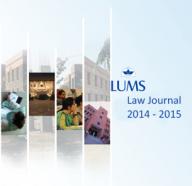
The LUMS Law Journal (LLJ) was initiated in 2013 at a time when Pakistan was experiencing its first democratic transition after a democratically elected government was completing its full term. At this juncture, constitutional debate was ripe owing to the elections and the 18th Constitutional Amendment. While these issues were and still are being debated, there is a dearth of legal scholarship on this subject. It is for this reason, amongst others, that Constitutional Law and Politics in Pakistan was chosen as the theme for the first issue of the LLJ.
The Journal was envisioned to contain two segments: Articles and Comments. Articles are substantive research pieces of 4,000 to 6,000 words, while Comments are discursive pieces of about 3,000 words. This issue contains Articles and Comments written by LUMS law students, academics and practicing lawyers. While the Comments relate to specific contemporary issues pertaining to the 1973 Constitution and the impact of the 18th Amendment, most of the Articles engage with a comparative constitutional analysis.
The first Article by Faryal Nazir provides an analysis of the emergency provisions provided under the 1973 Constitution, by discussing how they evolved from colonial times and simultaneously contrasts them with the emergency laws provided under the Constitution of India, 1949. The author explains how both countries have adopted the executive model of emergency powers from the colonial era, and suggests that they should shift towards a legislative model to circumscribe the discretionary powers of the executive.
In light of the growing religious tensions in Pakistan, the Article by Marva Khan provides a comparative analysis of the constitutional status of religious minorities in Pakistan and India, by outlining not only the discriminatory provisions in the respective constitutions of both nations, but also those which may be construed favourably. It is suggested that while there are three ways in which these issues may be addressed, that is, political compromise, constitutional guarantees, and international codes of conduct, the author emphasises the need to provide constitutional guarantees to ensure the protection of religious minorities.
The discussion on fundamental rights is furthered in the Article of Sara Jamil, who analyzes the elevation of education from a principle of policy to a fundamental right in Pakistan and India. The piece illustrates that even when education was not an enforceable right, courts in both jurisdictions interpreted it as a fundamental right. Thus judicial recognition of the right to education preceded its legislative enactment.
In light of the debates surrounding the Constitution and effects of its provisions, the Article by Saad Rasool sheds light on Pakistan’s legislators, who have the authority not only to amend the Constitution, but also to formulate statutes. This is done by analysing the qualifications and disqualifications for Parliamentarians set out in the 1973 Constitution, and how they have evolved over the years, laying emphasis on the 2013 General Elections held in Pakistan.
Saroop Ijaz’s Comment focuses on judicial appointments in Pakistan, and how the judiciary has exercised its dominance over this process. It is argued that although the 18th Constitutional Amendment sought to change this position by establishing a Judicial Commission and a Parliamentary Committee for judicial appointments, subsequent legislative and judicial developments have reverted the situation to as it was prior to the 18th Amendment.
Hina Hafeezullah’s Comment discusses how Pakistan, despite being a signatory to the Universal Declaration of Human Rights, only recently incorporated the right to fair trial in its constitution via the 18th Amendment. Despite this legal change, its application still falls short of what was initially envisioned under the Declaration. This is because the executive authorities blatantly violate this right and the police circumvent it through various procedures.
We would like to thank our Faculty Advisor, Professor Maryam S. Khan, for helping us initiate this venture and for her constant guidance and supervision during the editorial process. We would like to welcome on board Dr Zubair Abbasi and thank him for becoming a part of the project and for all the effort rendered by him for the publication of this issue.
We gratefully acknowledge the support from the head of Shaikh Ahmad Hassan School of Law, Dr Ali Qazilbash. We are also thankful to the Vice Chancellor, Dr Sohail Naqvi, for taking personal interest in the publication of this Journal. We strongly hope that this Journal will continue to publish regularly and provide a forum for healthy legal debates in Pakistan.

